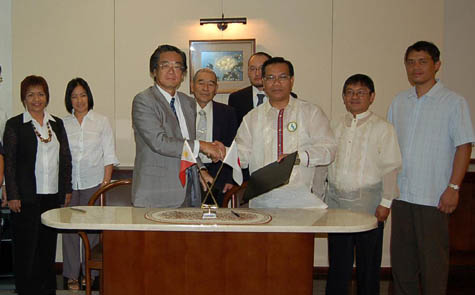
Japanese Ambassador Makoto Katsura congratulates La Trinidad Municipal Mayor Artemio Galwan after signing the grant contract for “The Project for the Improvement of the Organic Composting Facility in the Municipality of La Trinidad, Benguet” on March 10, 2010 at the Embassy of Japan. The ceremony was attended by Mr. Masaki Yokomori and Mr. Juntaro Nakajima (3rd and 4th from left), representatives from the Japan Agricultural Exchange Council, Officials from Municipal Government of La Trinidad and Embassy of Japan. |
Japanese Ambassador Makoto Katsura and La Trinidad Municipal Mayor Artemio Galwan signed the grant contract for “The Project for the Improvement of the Organic Composting Facility in the Municipality of La Trinidad, Benguet” on March 10, 2010 at the Embassy of Japan. The project, amounting to US$89,993 (approximately 4.1 million pesos) is funded through the Grant Assistance for Grassroots Human Security Projects (GGP).
The Municipality of La Trinidad is endowed with rich and vast track of agricultural lands, and has the largest vegetable trading p ost in the Philippines. More than 1,000 tons of vegetable s from the entire Benguet P rovince are traded in the municipality. The t rading p ost plays a vital role in the supply of highland vegetables to Metropolitan Manila and other parts of Luzon.
On the other hand, vegetable production in the municipality has faced two major problems. With the high demand for vegetables and other farm products, farmers have started to use inorganic fertilizers and pesticides in recent years, and the practice has caused soil degradation, poor plant growth and frequent disease outbreaks. Even though farmers want to use organic fertilizers, they have no choice but to buy chemical-based fertilizers due to the limited supply of organic fertilizers in the municipality.
Another pressing concern is the large quantity (about 60 tons) of vegetable wastes (trimmings) that are disposed at the v egetable t rading p ost every day. The La Trinidad Municipal Government has initiated the processing of these wastes by setting up a Materials Recovery Facility (MRF) , bu t the amount of organic fertilizer they can produce every day is not very large because of its limited capacity. Therefore, h uge quantity of garbage is still brought to the open dumpsite, which poses environmental concerns such as foul odor from decomposing garbage and methane gas emission. In addition, toxic liquids leaking out from the garbage dump site eventually contaminate rivers and springs that can affect water sources of the residents .
Under these circumstances, the Municipality of La Trinidad has decided to utilize the grant aid from the Embassy of Japan in the Philippines to expand and improve the MRF by constructing composting compartments inside it. It is expected that, by the improved facility, the production of organic fertilizers will increase, and farmers will be able to have access to good quality organic fertilizer s at reasonable prices. In addition, th is project will also help to reduce the emissions of carbon dioxide, methane and nitrogen oxides, which contribute to global warming. The grant aid will be also used for the purchase of a mini front tractor loader, which will help in loading, unload ing and mixing compost materials in a faster manner than manual shoveling.
GGP was launched in the Philippines in 1989 to reduce poverty and help various communities engaged in grassroots level activities. As of December 2009, more than 400 small-scale grassroots projects funded by GGP – ranging in cost from roughly 1 to 4 million pesos – have been implemented by NGOs, local government units, and other non-profit organizations. The total grant for these projects so far amounts to US$ 17,418,724 ( approximately 800 million pesos at P48/USD).
Japanese Version


